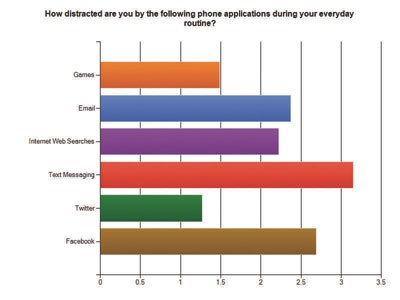
Cell phones are very useful and even necessary in daily life, except in the classroom. Students who use their cell phones during lecture time have found that they may experience themselves in a predicament that’s far from amusing.
These problems may occur on a small scale, like that of senior economics major Jordan Rymer.
“[I’m] whispering to a guy during class that I [do] not know at all,” said Rymer, “when, all of a sudden, my phone rings. I pull it out to see who it is. Then, he looks over and proceeds to ask why his girlfriend is calling me.”
While Rymer’s ‘oops’ moment involved only one other student, sophomore English major Natalie Sherman shared an uncomfortable cell phone experience with her entire class. While sitting in a small English class, Sherman’s catchy Sex and the City ring tone rang unexpectedly, loud and clear from her purse.
“Everyone knew it was me,” Sherman said. “My teacher even said she liked my ring tone. It was really embarrassing.”
The use of cell phones during class and study time causes detrimental effects for students, according to a survey taken in December 2009 by 185 SMU students on SurveyMonkey.com.
Cell phones distract 89 percent of students during study hours and nearly 77 percent of students during class. This “distraction” doesn’t necessarily involve receiving unexpected phone calls during class; it also refers to text messaging, playing on Facebook, checking emails, etc. – all of which require the active use of one’s cell phone.
SMU English professor Jasper Neel sees a connection between students who use their cell phones during class and the students “who have trouble with the attendance policy, who have trouble getting their papers in on time, who have all sorts of problems getting to class, who come to class without their textbooks, etc..” Neel said, “It’s not surprising” that these two groups are one in the same.
Lack of preparation for class is just one negative consequence these cell phone users experience. Another consequence is embarrassment.
“When your cell phone goes off in class,” said senior English major AJ Petrozzi, “and it will happen to you at least once at SMU, it’s humiliating to be the one silencing the noise of Britney Spear’s latest single. I’ve seen it happen.”
What might be even more embarrassing is when a professor stops the lecture to point out a student’s lack of attention.
Randall Scalise, senior lecturer of the Physics Department, likes to test this method. He will call on a student who he thinks is not listening to the lecture and ask the student to repeat what he has just said. This does not always keep students from playing on their phones, though, Scalise said.
Senior finance major Wynne Barton learned of a consequence worse than embarrassment when electrical engineering professor W. Milton Gosney threatened his students with cell phone destruction.
Gosney planned a scenario in which he asked Barton to pretend to talk on the phone during class. When nearby students noticed Barton speaking on the cell phone (which actually belonged to Gosney), the professor took the phone out of Barton’s hands and “bashed it with a hammer,” said Barton. “I thought it was pretty funny and it got the point across.”
Most professors include a policy about cell phone usage in their syllabus. Senior English major Brenden Hexberg says that most syllabi lay down roughly the same rules – cell phone usage is strictly forbidden.
“A few professors have gone so far as to mark absent those students whose cell phones cause a distraction,” Hexberg said.
Scalise’s cell phone policy states exactly that, and more. If a student’s phone rings during class, that student gets a zero for the day. In addition, if the same student decides to answer the ringing phone, he or she will fail the course.
Not withstanding Scalise’s policies, 88.6 percent of the students say they receive few to no penalties for using their cell phones during class according to the results from SurveyMonkey.com.
“Texting and Internet browsing on smart phones are probably beyond the instructor’s control.” Scalise said. “As is [Internet] surfing and e-mail reading on laptops. If a student chooses to do that instead of paying attention in lecture, that is their choice.”
Tony Pederson, professor and Belo Distinguished Chair in Journalism, agrees. Pederson conducts a lecture class of roughly 65 students in which a considerable amount of material is covered.
“If students want to fritter away time on cell phones or the Internet,” Pederson said. “They will just miss a lot of material and suffer the consequences on exams.”
Students who think that they are masters at covertly playing with their cell phones during class without getting caught had better think again. Most teachers, including Neel and Scalise, say that these students are conspicuous.
“In the small PhD seminars, cell phones are no issue whatsoever,” Neel said. “In the really large classes there are always a few who hold their texting devices under the desk hoping not to be noticed; they are noticed.”
Hexberg says the real difference between each professor and his or her cell phone policies is not so much the policy itself, but “the extent to which a professor will enforce these rules.”
The extensive use of cell phones on campus exists for one simple reason: Students feel a significant attachment to their cell phones. They have such an affinity for these devices that they cannot seem to quit the game they are playing or cease a text message conversation.
Sherman, the sophomore English major, admits to being “very attached” to her cell phone.
“I usually have it in my hand at all times. I have never lost it, and I would be devastated if I did,” Sherman said.
Seniors Petrozzi and Rymer also agree that they are strongly attached to their phone.
Petrozzi confesses to being always connected to his phone. He said that if he did not turn off his phone to study, he would “be spending valuable time texting, browsing, or posting on [Facebook] walls.”
Barton believes that using a cell phone instead of a watch to tell time is an everyday example of cell phone dependency.
“How many people look at their cell phones now when you ask them what time it is?” Barton asks.










